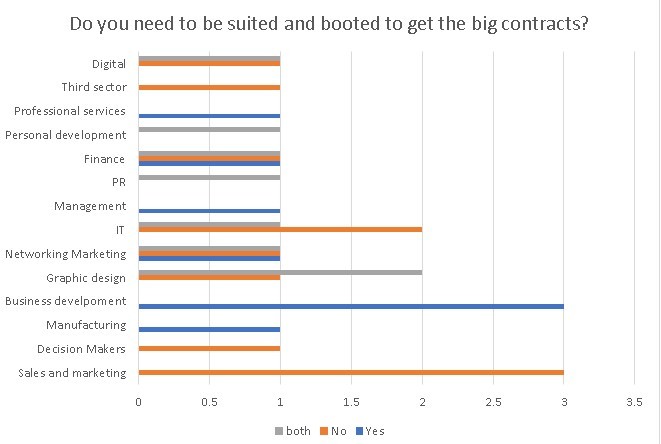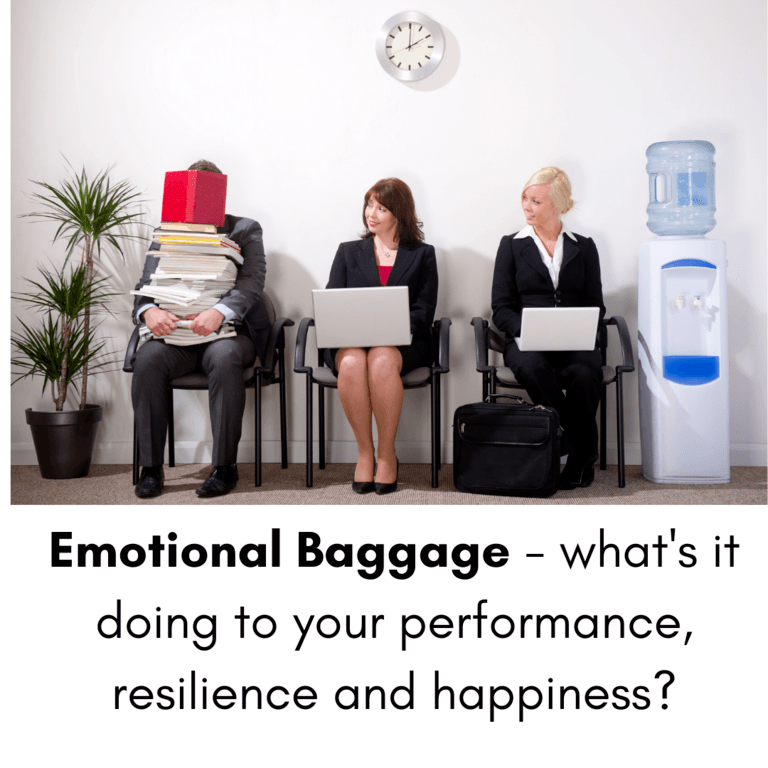Do you need to be suited and booted to get the big contracts?
It’s a good gauge that if more than a handful of people ask a question then you should help them find a solution. Therefore, when I was asked (again) by a business man during a coaching session and numerous occasions by women from many professions if they had to be suited and booted to get the high-end contracts and the big opportunities I thought it was time to carry out some research.
Can you attract the right clients and dress anyway that makes you feel comfortable or do you risk missing out?
I have my own thoughts however I can’t help but remember the person at a prestigious networking event in the city who happily shared how “2 gentlemen that only wore sports coats to a meeting couldn’t possibly expect to get investment into their company” and that cost them 6 figures. A costly outfit!
So, I asked my social media world “Do you need to be suited and booted?” and interestingly the opinions were very mixed.

In some industries, it would appear anything goes, even flipflops and yet for others if you don’t shine your shoes and straighten that tie you could be damaging your profit margin. Scary right?
So what drives these views?
How can it be that one industry is allowed to rock up like it’s a party and another has to dress like it’s someone’s funeral?
Thanks to all of the views shared it would appear the need to dress a certain way is a little like a supertanker, it’s on the turn but it’s going to take a while. And of the thoughts shared the most shocking was that it was okay for men to turn up in jeans but frowned upon in the same professions for women to do the same.Do some things never change!
Many of the creative industries shared ideas like international graphic designer Esther Feltham from Eyespeak “people don’t expect designers to dress formally.” Adding “there are expectations associated with dress and profession. It’s all about identity”. A view shared by many as James Brand CEO From Innovative Creatives Ltd (UK) shared “I think it very much depends on what you are selling and who the corporate is. I believe while they might be buying a product or service they are buying into a company selling it. If you are a creative company I think a really formal dress can make you appear not to be creative and less innovative. It must be a judgement call based on the individual client.” A few shared by many.
Fascinatingly views varied from Facebook to LinkedIn too. Facebook commenters were far more likely to say “wear what makes you feel good and comfortable” whereas LinkedIn commentators raised more concerns that it could be a risk to get it wrong.
Adding that it wasn’t just about your outfit’s impact on you and your customers some believed that what you wear can even impact on your ability to perform. And the ability of others to see you as the expert. Would you trust a doctor or lawyer who dressed in a T-shirt and jeans?
As someone who’s employed to enable people to think more powerfully, override built-in limitations, enable innovative thinking and empower higher performance I, like many of our commentators sit in the middle on this one. As I explained to one client who bought this question to me I’ve even changed the colour of my lipstick or nails to be “more in keeping” with what my audience of that day would like. And yet I’ve also turned up to a corporate event where most of the people in the room would fit the £100,000K+ bracket and wear a long satin baby pink skirt (think Sarah Jessica Parker from Sex in the City) just because I’ve known that it would be a roomful of grey and black suits and that I would stand out. (And yes that has worked very well for me!)
Would I have done this years ago? Probably not. in my 9+ years in the automotive industry, I never wore jeans to work. I was always suited and booted, why? Because I was dealing with people who had just been involved in a car accident and were relieved to be alive. They wanted someone to look like they had authority to take charge of the situation and put their minds at rest. Could I have done this in jeans and a jumper? Probably, however, would the paramedic, police or fire services be anything other than in uniform? And does a uniform help create feelings in us?
Another reason I have never worn jeans to work is because my parents saw denim as workwear and as such it would have been disrespectful to wear. This is also a thought-provoking point that came up time and time again that to not wear the right outfit showed a lack of respect for the company you were aiming to work with as well as the people that you led. One commentator said, “It doesn’t have to be a designer suit, however turning up and looking like you care, shows that you do.”
So it’s one thing to be disruptive and another to be disrespective? It’s good to stand out and sometimes it’s definitely better to fit in, but how can you know when you should pull out your favourite outfit and be a metaphorical giraffe in a field of cats and when should you buckle down, shine your shoes and look like a row of eggs?
One business owner said that they realised that they’d misread the company and it probably cost them the contract because they’d not dressed in the right way. “It wasn’t about the fashion, however, I shouldn’t have arrived in a full suit, it made me look stuffy and not with the times. “So how can you ensure you get it right?
As an individual or representative of an organisation, it is important to know your brand. What do you stand for? What is your mission? What message does your company wish to portray online and offline and do you mirror this in real life? What words would your ideal clients use to describe you?
This is interestingly where I often see a lack of alignment between on and off line and it is the “gut instinct” reason why people don’t buy from you, because something “didn’t add up.”
My company was one of 2017 top 100 small businesses for The Guardian and at a celebration ball we had to find a business that we’d been handed the name of, like a giant treasure hunt. Towards the end of the evening someone was struggling to find their “treasure” when I asked the persons name and what they did I guessed the person (out of over 200 people) straight away. The group of people I was with were astonished and retorted “you must already know them!” I didn’t I’d just put 2 and 2 together and worked out what they were likely to look like. As a coach, you are pretty good at sussing people out fast, and on this occasion, I’d looked at the branding, the colours, the tonality and the profession and it had been easy to find them.
Try it at an event you attend. Guess what the person you don’t know does for a living. It could help you to appreciate the impact your outfit could be having on your success, your brand’s strength and your contracts.
If you become more aware of your brand and the way you portray yourself, you can also then start to ask yourself if your brand matches that of your ideal clients. In this way even if you get the outfit wrong if you correlate in all other respects the contract could still be yours. Do you use the same terminology? The same language? Do they use a ton of jargon but you don’t?
When you know who your target audience is and what they would like to expect it, you can showcase your respect for the individual and the organisation by getting this right. However here is where the clothes can become irrelevant. Ultimately it is about what is on the inside.
You can be the best-dressed person in the room however if you can’t impress with your knowledge, ideas and ability to communicate effectively then you still lose out. And that is not just about being the best qualified for the job it is about being the most confident to believe you are right for the job. (Are we then back to the clothes and the argument that we should wear what makes us feel comfortable? You can see why it can make it a tough call and easy to get wrong.)
I’ve been given opportunities that I’ve never imagined because of the way I’ve have portrayed myself, (they ignored the Eiffel tower Mickey Mouse earrings, it was my passion for their success that mattered more.) Then we are doing a complete 360 back to that your outfit is not important, because if your outfit makes you feel good, then you feel differently, and if you feel different you act different and if you act differently you get different results.
Therefore while it will always be important to look like you want the job, show respect and be on brand nothing is more important than the internal confidence that says “I’m the right person for that job!” I remember my first boss worked on the garage floor and one day had a meeting with the bank manager when he arrived our accountant said the boss looked like he was a 1920’s convict who had just finished a hard day of graft. To which the boss replied something along the lines “They aren’t interested in my fashion sense just my profit margin.”
So if you feel good, don’t risk offending your perfect clients and your mindset means you perform better then go for it, right?
Just be cautious of the 2 men in sports jackets that completely misread their target audience and missed out on 6 figures.
Afterall people don’t just buy a product or service, they buy the people and the brand behind it.
So while I appreciate the need to mirror my audience I’m also considered someone that is award-winning, innovative and cutting edge, so it’s good to be a part of the forward-thinking movement as long as I know it will be tolerated and not damage my success, and that ultimately comes down to being confident in who you are. As if choosing an outfit first thing in the morning wasn’t hard enough!
Thank you to everyone that shared their views and thoughts on LinkedIn and Facebook, if you would like me to look at other aspects that can impact on our success, please do not hesitate to make a suggestion.





